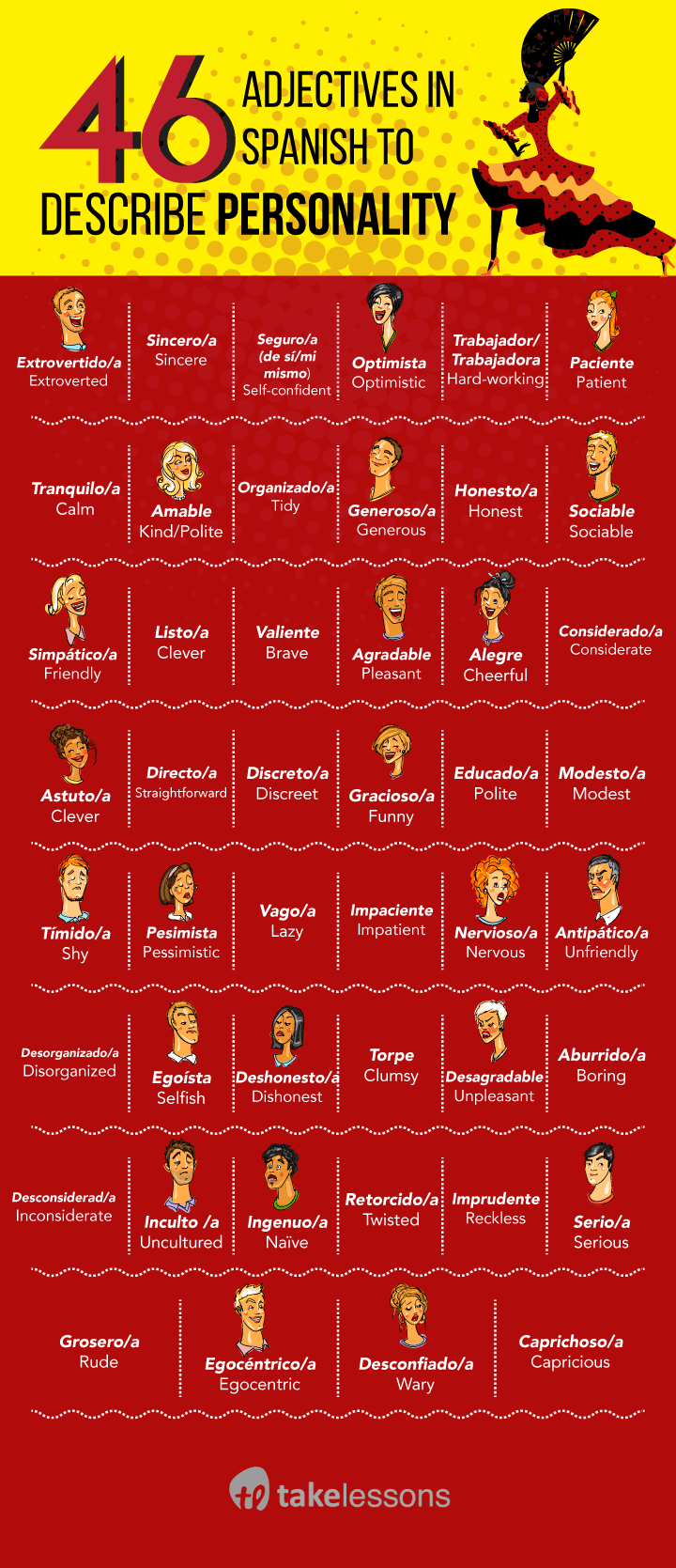Spanish adjectives are crucial to learn and memorize if you want to be fluent in Spanish. Spanish adjectives will help you describe places, things, and especially – people!
If you’re learning Spanish, you might already know a few basic nouns and verbs to carry on a conversation. Now is the perfect time to start learning some extra, descriptive words! There will be many times in conversation when you’re looking for just the right word to describe a quality or trait, and our Spanish adjectives chart is sure to come in handy for each of them.
In this post, we’ll share how to use over 100 of the most common Spanish adjectives. (You’ll also be able to download a free worksheet to practice all the new vocabulary you’ve learned at the end!)
What Are the Three Types of Adjectives in Spanish?
Typically, Spanish adjectives can be categorized as one of these three types:
- Descriptive
- Adverbial
- Relational
There are also adjectives that are meant to serve as nouns.
Why do you need to know what sorts of adjectives you’re working with? The type of adjective will dictate where the word should be placed in a sentence as well as whether it can be used in a superlative or comparative way.
That said, as you’re learning Spanish adjectives, you don’t need to know quite as much as whether they are relational, descriptive, or adverbial – it’s more important that you get the vocabulary words memorized first. Most of the adjectives we’ll give to you in this list are descriptive, helping you come up with the right terms you need to know in order to use adjectives to describe someone.
If you’re new to learning the Spanish language, you might want to consider taking lessons. This will help you learn the best tips and techniques for picking up the language.
Another way to get the hang of things? By watching videos! Here’s a great example of some best practices you can follow:
How to Use Spanish Adjectives to Describe a Person
There are a few ways to form sentences with Spanish adjectives. Here are some examples to get you started.
- Juan es muy mentiroso. Siempre dice cosas que no son verdad.
- Mis padres tienen un carácter fuerte, pero son muy amables.
- Tengo mucho sentido del humor y por eso soy gracioso.
In most cases though, you’ll use the verb ser in combination with an adjective. For example:
- Ella es simpática.
- Ellos son graciosos.
- Nosotros somos organizados.
Learning how to conjugate the verb ser will be a huge help when it comes to using these Spanish descriptions of a person. Now, are you ready to learn some new descriptive words Spanish? Here are 46 adjectives that will help you describe yourself, your friends, and your family. (Some of these words can also be used to describe places and things).
The Ultimate Spanish Adjectives List

Possessive Adjectives Spanish
Possessive adjectives in Spanish indicate who or what owns something. An example in English would be “this is MY brother” or “he is YOUR friend.”
These words have both plural and singular forms, with possessive adjectives “vosotros” and “nosotros” also having feminine and masculine forms.
Check out this list of adjectives in Spanish that are examples of possessive adjectives:
- Mi
- Tu
- Su
- vuestro/vuestra
- nuestro/nuestra
- Su
- Mis
- Tus
- Sus
- vuestros/vuestras
- nuestros/nuestras
Demonstrative Adjectives Spanish
Demonstrative adjectives in Spanish are meant to point at something – the English equivalent would be this, that, these, and those.
There are 12 demonstrative adjectives in Spanish. They are as follows.
Singular Demonstrative Adjectives in Spanish
- esta/ este (this)
- esa/ ese (that)
- aquella/ aquel (that)
Plural Demonstrative Adjectives
- estas/estos (these)
- esas/esos (those)
- aquellas/aquellos (those)
Descriptive Adjectives in Spanish
Here are some descriptive adjectives – they’ll help you add color and personality to just about any sentence!
- disgusting – repugnante
- rich – rico
- poor – pobre
- delicious – delicioso
- new – nuevo
- old – viejo
- young – jovan
- open – abierto
- closed – cerrado
- sad – triste
- worried/concerned – preocupado
- tired – cansado
- awake – despierto
- hot – caluroso
- cold – frío
- warm – tibio
- right/correct – correcto
- wrong/incorrect – equivocado
- expensive – caro
- cheap – barato
- good – bueno
- bad – malo
- heavy – pesado
- light – ligero
- fast – rápido
- slow – lento
- crazy – loco
- tranquil – tranquilo
- noisy – ruidoso
- complicated – complicado
- easy – fácil
- difficult – difícil
- hard – duro
- sick- enfermo
- healthy – sano
Here are a few more you can memorize!
- strong – fuerte
- weak – débil
- clean – limpio
- dirty – sucio
- savory – salado
- bitter – amargo
- salty – salado
- fair – justo
- unfair – injusto
- dry – seco
- wet – mojado
- empty – vacío
- full – lleno
- married – casado
- single – soltero
- necessary – necesario
- private – privado
- safe – seguro
- dangerous – peligroso
- perfect – perfecto
- ridiculous – ridículo
- fabulous – fabuloso
- marvelous – estupendo
- foreign – extranjero
Words to Describe Personality in Spanish
These personality traits list in Spanish adjectives can be used to describe a person can be used in almost any situation. There are words to describe personality of every kind!
- abierto/a – open
- aburrido/a – boring
- afortunado/a – lucky
- agradable – pleasant
- agresivo/a – aggressive
- amable – nice
- amable/amigable – friendly
- ambicioso/a – ambitious
- antipático/a – unfriendly
- aventurero/a – adventurous
- buena gente – a good person
- capaz – capable
- cariñoso/a – loving
- cerrado/a – closed-minded
- cómico/a – funny
- confiable – reliable
- cursi – cheesy
- delicado/a – delicate
- desafortunado/a – unfortunate
- desagradable – unpleasant
- despistado/a – scatter-brained/absent-minded
- divertido/a – fun
- dulce – sweet
- egoísta – egotistical
- enojado/a – angry
- estresado/a – stressed
- estudioso/a – studious
- expresivo/a – expressive
- extrovertido/a – extroverted
- fiel – loyal
- flojo/a – lazy
- generoso/a – generous
- gentil – gentle
- grosero/a – rude
- honesto/a – honest
- impaciente – impatient
We’re not done yet. Here are some more!
- Importante – important
- imprudente – careless
- indiferente – indifferent
- inteligente – intelligent
- intenso/a – intense
- interesante – interesting
- maleducado/a – rude
- melancólico/a – melancholic
- mimado/a – spoiled
- negativo/a – negative
- optimista – optimistic
- organizado/a – organized
- paciente – patient
- perezoso/a – lazy
- pesimista – pessimistic
- práctico – practical
- prudente – cautious
- relajado/a – relaxed
- sensible – sensible
- simpático/a – nice
- sincero/a – sincere
- sociable – social/out-going
- tacaño/a – cheap
- terco/a – stubborn
- tierno/a – tender
- trabajador – hardworking
- tranquilo/a – calm
- valiente – brave
How Do You Make Spanish Adjectives Stick? Ways to Get Additional Practice
Want even more practice using words to describe people? You can download a free worksheet here to review the vocabulary above and practice forming sentences using words to describe people. After, you can check out these additional resources to help you learn more about Spanish vocabulary and grammar:
- 7 Easy Tricks for Memorizing Spanish Vocabulary
- Spanish Vocabulary: Feelings and Emotions in Spanish
- Intro to Spanish Verb Conjugation | Tips, Charts, & More
- 75 Spanish Cognates to Know
We hope you enjoyed this guest post on this Spanish list of adjectives by Sara from Spanish2Learn. Can you think of any more unique and advanced Spanish adjectives that describe people to add to this list? Let us know in the comments below!
Photo by Antoine K
Suzy S.
![100+ Spanish Adjectives to Describe All Your Friends [Printable List]](/_next/image?url=https%3A%2F%2Ftakelessons.com%2Fblog%2Fwp-content%2Fuploads%2F2016%2F09%2Fblonde-826027_1920.jpg&w=3840&q=75)






